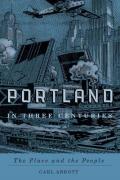
What is it about this city? What makes Portland so Portlandy... Portlandish... Portlandian...?
It's not what you might think.
Despite Carrie Brownstein and Fred Armisen and the Portlandia spoofs, this is a conservative place.
That's not Jesse Helms and Michele Bachmann conservative (No!!). It's literal conservatism — Portlanders like what they have and they want to keep it.
We want to keep old neighborhoods viable for new generations rather than throwing them away. We want to keep a strong downtown that recalls the best of the 1950s. We don't have any dead zones of abandoned buildings (that's why it proved so hard to identify a good site for a new baseball park). We've struggled to preserve the surrounding farm and forest lands that add so much to the ambiance of the metropolitan area. Portlanders are trying to roll back the clock with streetcars and bicycles. The city government has protected older industrial districts through industrial sanctuary zoning (one of the best ideas Portland planners have ever come up with).
Portlanders have long had a tendency to define the city by contrast — it's "not Los Angeles" and "not Seattle." They object to trendiness, brand-name fetishism, and a boom-bust economy. Indeed, Portland has always had a "grow/plateau" economy in which a prosperous decade (1940s, 1970s, 1990s) is followed by a decade of consolidation (1950s, 1980s, 2000s). Good economic times are never as good in Portland as they are in Seattle, but bad times are never as bad.
Portland's present-day reputation as a progressive and (possibly) hip city is actually the result of a set of "conservative" political deals put in motion in the 1970s and 1980s by a remarkable generation of leaders (including the-mayor-who-must-not-be-named).
- Downtown business leaders and neighborhood activists agreed to cooperate rather than fight. Strong close-in neighborhoods provide workers and customers for downtown businesses, and a viable downtown makes older neighborhoods attractive.
- Strong public transit can link core neighborhoods and relieve pressure on the road system.
- A regional rail system can benefit both Portland and key suburbs like Gresham, Hillsboro, and Milwaukee that have waited patiently as lines have slowly been added.
- The Urban Growth Boundary simultaneously serves the needs of existing cities and neighborhoods and protects natural systems.
Take these points together and we come up with the remarkable situation — especially in 2011 — that Portlanders actually talk to each other about civic issues. City and suburbs talk with each other and sometimes even agree. The same goes for urbanists and environmentalists.
We can use a baseball analogy to describe the city in a different way. Portland does not stake its future on one or two home run hitters. The city has built its success on singles, bunts, stolen bases, and an occasional triple over the head of the right fielder.
For those who cringe at sports metaphors, let me translate. Portland has made itself a very livable metropolis by increments. It has done lots of small things and mid-scale things that have slowly built momentum rather than staking everything on one megaproject. Nothing that Portland has done is unique in itself. What makes the city unusual is patience and consistency in putting together one small piece after another.
Careful innovation, cautious change, conscientious civic life... it all adds up to a conservatively progressive city.